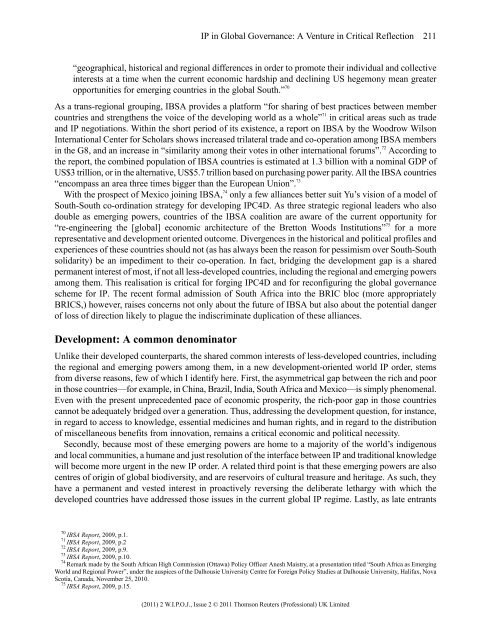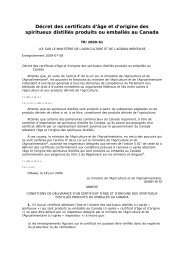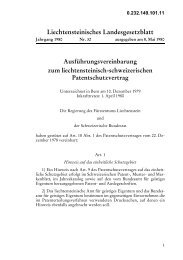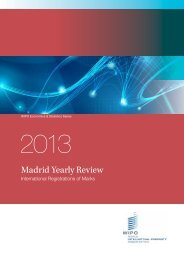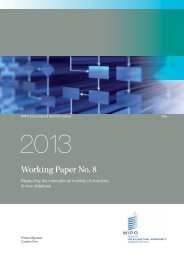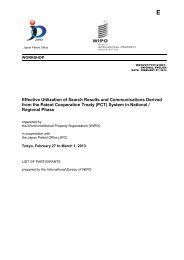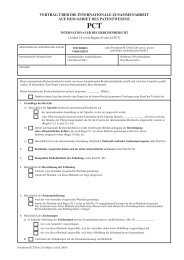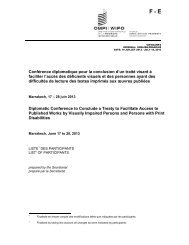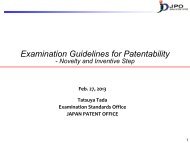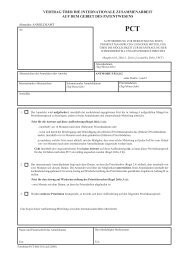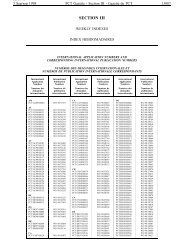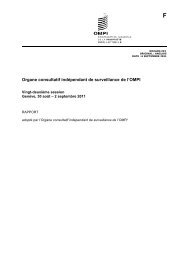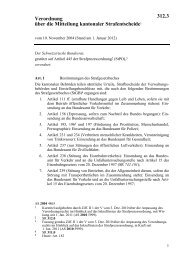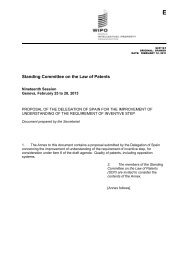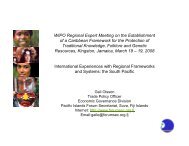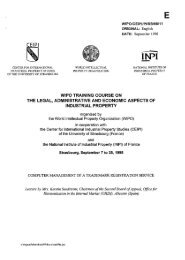WIPO Journal - World Intellectual Property Organization
WIPO Journal - World Intellectual Property Organization
WIPO Journal - World Intellectual Property Organization
You also want an ePaper? Increase the reach of your titles
YUMPU automatically turns print PDFs into web optimized ePapers that Google loves.
“geographical, historical and regional differences in order to promote their individual and collective<br />
interests at a time when the current economic hardship and declining US hegemony mean greater<br />
opportunities for emerging countries in the global South.” 70<br />
As a trans-regional grouping, IBSA provides a platform “for sharing of best practices between member<br />
countries and strengthens the voice of the developing world as a whole” 71 in critical areas such as trade<br />
and IP negotiations. Within the short period of its existence, a report on IBSA by the Woodrow Wilson<br />
International Center for Scholars shows increased trilateral trade and co-operation among IBSA members<br />
in the G8, and an increase in “similarity among their votes in other international forums”. 72 According to<br />
the report, the combined population of IBSA countries is estimated at 1.3 billion with a nominal GDP of<br />
US$3 trillion, or in the alternative, US$5.7 trillion based on purchasing power parity. All the IBSA countries<br />
“encompass an area three times bigger than the European Union”. 73<br />
With the prospect of Mexico joining IBSA, 74 only a few alliances better suit Yu’s vision of a model of<br />
South-South co-ordination strategy for developing IPC4D. As three strategic regional leaders who also<br />
double as emerging powers, countries of the IBSA coalition are aware of the current opportunity for<br />
“re-engineering the [global] economic architecture of the Bretton Woods Institutions” 75 for a more<br />
representative and development oriented outcome. Divergences in the historical and political profiles and<br />
experiences of these countries should not (as has always been the reason for pessimism over South-South<br />
solidarity) be an impediment to their co-operation. In fact, bridging the development gap is a shared<br />
permanent interest of most, if not all less-developed countries, including the regional and emerging powers<br />
among them. This realisation is critical for forging IPC4D and for reconfiguring the global governance<br />
scheme for IP. The recent formal admission of South Africa into the BRIC bloc (more appropriately<br />
BRICS,) however, raises concerns not only about the future of IBSA but also about the potential danger<br />
of loss of direction likely to plague the indiscriminate duplication of these alliances.<br />
Development: A common denominator<br />
IP in Global Governance: A Venture in Critical Reflection 211<br />
Unlike their developed counterparts, the shared common interests of less-developed countries, including<br />
the regional and emerging powers among them, in a new development-oriented world IP order, stems<br />
from diverse reasons, few of which I identify here. First, the asymmetrical gap between the rich and poor<br />
in those countries—for example, in China, Brazil, India, South Africa and Mexico—is simply phenomenal.<br />
Even with the present unprecedented pace of economic prosperity, the rich-poor gap in those countries<br />
cannot be adequately bridged over a generation. Thus, addressing the development question, for instance,<br />
in regard to access to knowledge, essential medicines and human rights, and in regard to the distribution<br />
of miscellaneous benefits from innovation, remains a critical economic and political necessity.<br />
Secondly, because most of these emerging powers are home to a majority of the world’s indigenous<br />
and local communities, a humane and just resolution of the interface between IP and traditional knowledge<br />
will become more urgent in the new IP order. A related third point is that these emerging powers are also<br />
centres of origin of global biodiversity, and are reservoirs of cultural treasure and heritage. As such, they<br />
have a permanent and vested interest in proactively reversing the deliberate lethargy with which the<br />
developed countries have addressed those issues in the current global IP regime. Lastly, as late entrants<br />
70 IBSA Report, 2009, p.1.<br />
71 IBSA Report, 2009, p.2<br />
72 IBSA Report, 2009, p.9.<br />
73 IBSA Report, 2009, p.10.<br />
74 Remark made by the South African High Commission (Ottawa) Policy Officer Anesh Maistry, at a presentation titled “South Africa as Emerging<br />
<strong>World</strong> and Regional Power”, under the auspices of the Dalhousie University Centre for Foreign Policy Studies at Dalhousie University, Halifax, Nova<br />
Scotia, Canada, November 25, 2010.<br />
75 IBSA Report, 2009, p.15.<br />
(2011) 2 W.I.P.O.J., Issue 2 © 2011 Thomson Reuters (Professional) UK Limited


